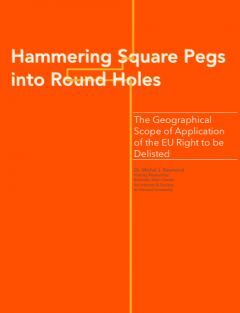
Hammering Square Pegs into Round Holes
The Geographical Scope of Application of the EU Right to be Delisted
In this paper, Michel Reymond explores the extraterritorial effects of the Google Spain decision rendered in May 2014 by the European Court of Justice. Through a methodology inspired by private international law, the author examines the geographical reach of the so-called ‘Right to be Forgotten,’ which is more correctly identified as a ‘Right to be Delisted.’ Using a series of hypothetical cases, he explores and explains the conditions necessary to subject search engines headquartered outside of the territory of the European Union to the obligation of partially delisting ‘irrelevant’ or ‘outdated’ URLs which may harm the privacy rights of European citizens. He arrives at the following key findings:
Determining the geographical scope of the Right to be Delisted on a case-to-case basis is currently an excessively complex process, as it relies on the uneasy combination between specific ad hoc rules found in Google Spain and in the recent opinions of the Article 29 Working Party, and the general scope rules the 95/46/EC Data Protection Directive.
The Right to be Delisted, as the expression of an eminently personal right to privacy, clashes with the Directive’s focus on data processing and on the activity of data controllers to establish its scope. Thus, when applied to individual case scenarios involving delisting requests, these rules do not provide adequate nor consistent results.
A global “place of harm” standard, similar to how privacy torts are handles in private international law, should be relied upon instead. To some extent, it already has, as search engine practice use the place of the habitual residence of the claimant as the main locus for individual delisting queries. The paper provides proposals which could be used to codify and further shape this established practice.
The paper is part of Michel Reymond's ongoing work on the topic; it has been developed during his time as a visiting researcher at the Berkman Klein Center for Internet & Society under funding from the Swiss National Science Foundation.